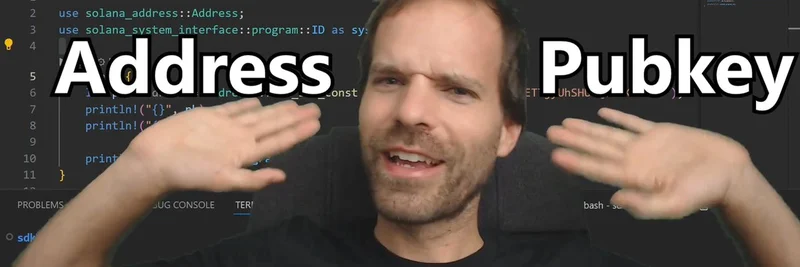Hey there, fellow blockchain enthusiasts! If you're diving into the world of meme tokens on Solana, you've probably come across terms like "public key" and "address" thrown around like they're the same thing. But guess what? They're not, and understanding the difference just got a whole lot more important with the release of Solana SDK v3.0.0.
This insight comes straight from a recent thread by Solana dev and educator @HeyAndyS, who breaks it down in a fun, accessible way. In his post, he highlights how this distinction is the driving force behind a major version bump in the Rust crates for Solana development. Let's unpack this and see why it matters for your next meme token project.
What's the Big Deal with Public Keys and Addresses?
In the Solana ecosystem, a public key (often called Pubkey) is essentially a 32-byte cryptographic key used to identify accounts on the blockchain. Think of it as the raw, binary identifier that the network uses under the hood. On the other hand, an address is the human-readable version of that public key, encoded in Base58 format. It's what you see in your wallet, like a string of letters and numbers that's easier to copy-paste without errors.
Why separate them? Well, mixing them up can lead to bugs in your code, especially when building smart contracts or programs for meme tokens. For instance, if you're creating a token launchpad or a DEX integration, treating a string address as a binary pubkey could cause validation failures or security vulnerabilities. Solana's dev community has been pushing for clearer type distinctions to prevent these mix-ups, and that's exactly what v3.0.0 delivers.
In the thread, Andy shares a snippet of Rust code showcasing the new Address type alongside the traditional Pubkey. This change enforces better practices right in your IDE, making your code more robust and less prone to those head-scratching errors.
Why the Major Version Update?
Major updates (like jumping to v3) aren't taken lightly—they signal breaking changes that could affect existing projects. Here, the Solana team introduced this separation to improve type safety in the SDK's Rust crates. If you're a developer, this means you'll need to update your imports and refactor spots where you might have been using Pubkey interchangeably with address strings.
For meme token creators, this is a golden opportunity. Many meme projects start as quick launches using tools like Pump.fun or Raydium, but if you're going custom with on-chain programs, adopting v3.0.0 early can give you an edge. It helps ensure your token's smart contracts are secure, reducing the risk of exploits that could tank your community's trust (and your market cap).
Andy even tagged some key figures in the Solana dev space, like @solana_devs and others, to spread the word. The thread has sparked discussions, with replies praising the clarity it brings to foundational concepts.
How This Affects Meme Token Development on Solana
Meme tokens thrive on speed and virality, but skimping on basics like this can lead to disasters. Remember those rug pulls or failed launches? Sometimes, they're due to simple coding oversights. By embracing the Pubkey vs. Address distinction, you can build more reliable tools—whether it's for airdrops, staking mechanisms, or community governance.
If you're new to this, start by checking out the original thread on X for the full context. And don't miss Andy's video explanation linked there: watch it on YouTube. It's packed with visuals and real code examples that make the concept click.
Wrapping It Up
As Solana continues to dominate the meme token scene with its low fees and high throughput, staying on top of SDK updates like v3.0.0 is key to leveling up your dev skills. This public key vs. address tweak might seem small, but it's a step toward safer, more efficient blockchain apps. Whether you're coding your first meme coin or optimizing an existing one, grasp this now and thank yourself later.
Got questions or your own experiences with Solana dev? Drop them in the comments below—we're all about building that knowledge base here at Meme Insider! 🚀



